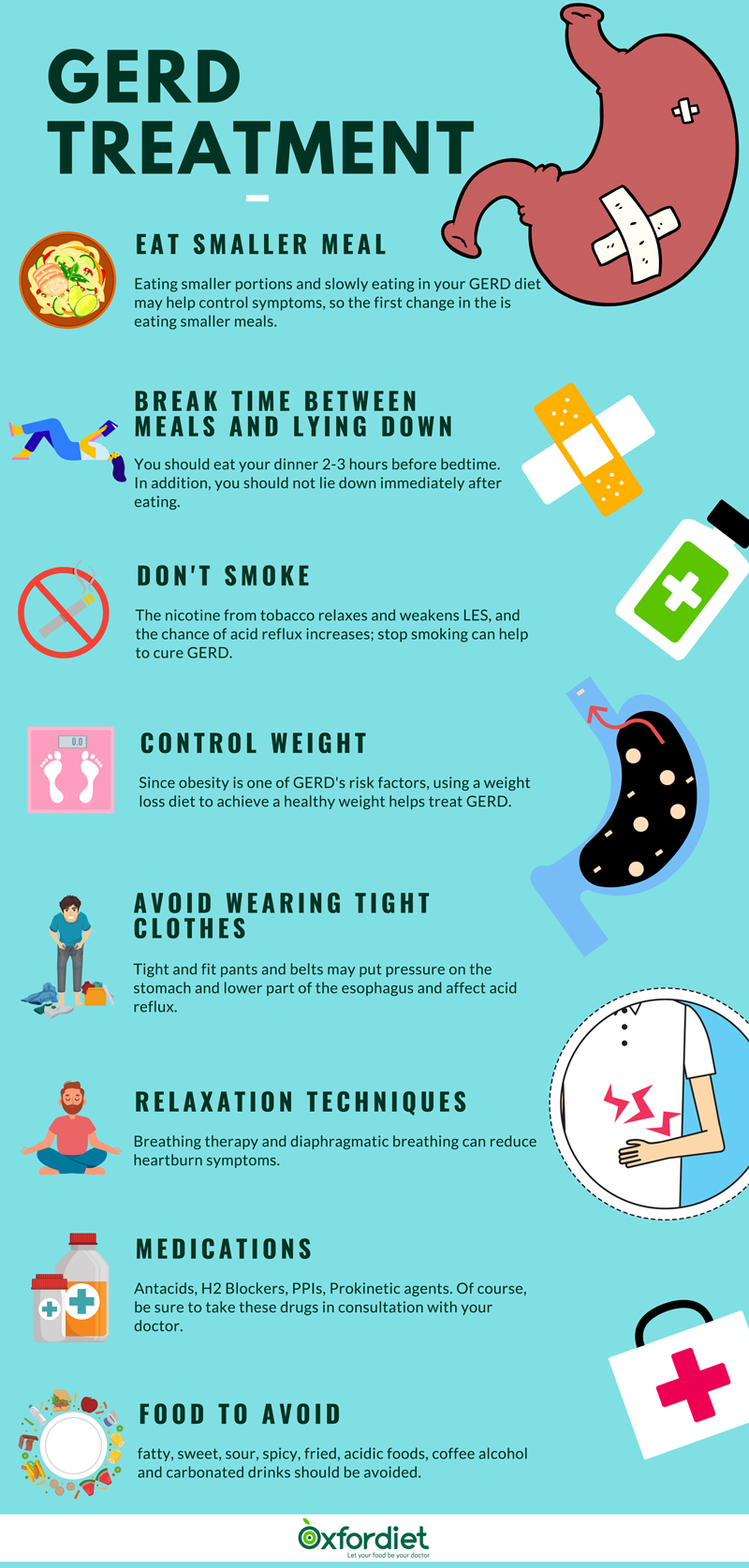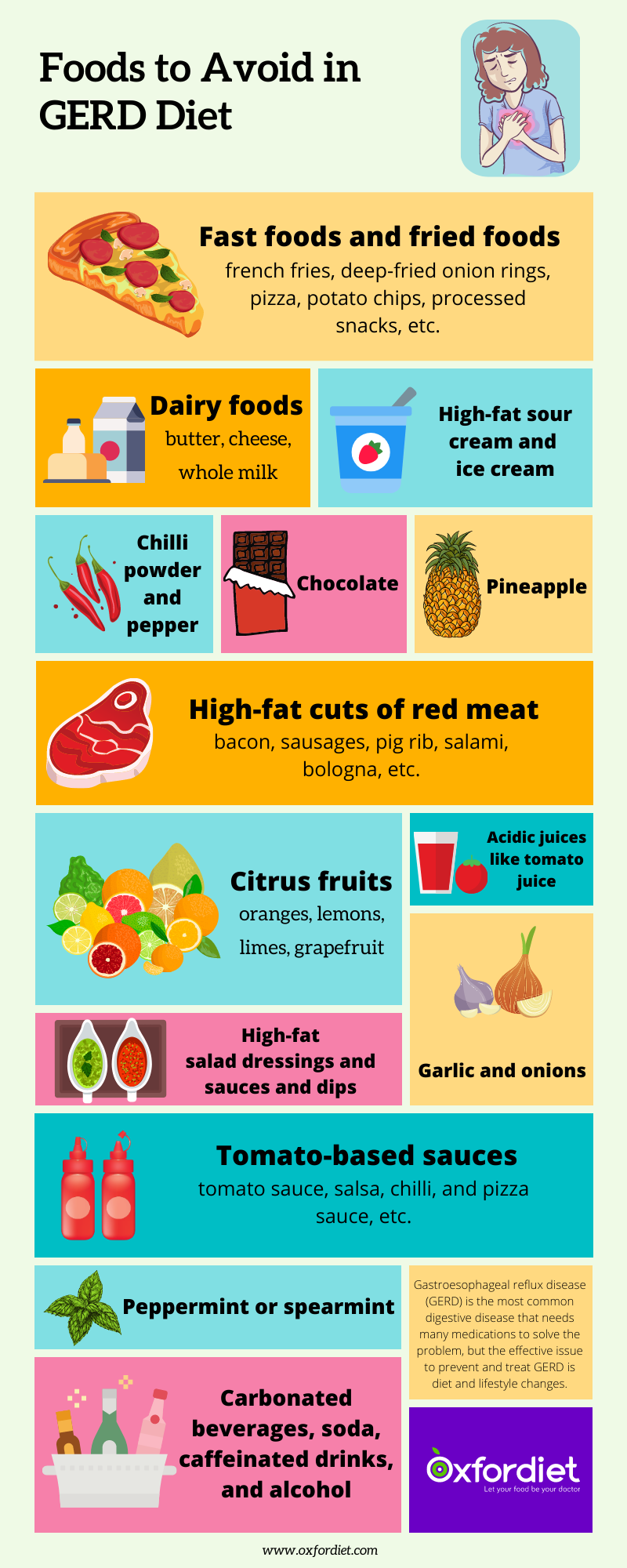GERD (Gastroesophageal reflux disease) is the most common digestive disease that needs many medications to solve the problem, but the effective issue to prevent and treat GERD is diet and lifestyle changes. The diet itself can contribute to gastroesophageal reflux disease development, and the GERD diet can cure the disease. GERD diet is a combination of solutions for helping sufferers to reduce painful, irritating, and annoying diagnostic and clinical signs. GERD diet besides medications can have a significant role in having a better healthy life.
Medications such as antacids and PPIs will lower stomach acid. But how low stomach acid causes acid reflux? Low stomach acid allows bacteria to grow in the stomach, and the number rise of bacteria by itself can induce reflux. Having a good GERD diet will collaborate with the reduction of disease development.
Several changes are suggested to help diminish GERD symptoms; The most important is a good diet for GERD and lifestyle changes. Below is a list of changes you should make in your GERD diet and lifestyle totreat GERD:
♦ Eat smaller meals: Eating smaller portions and slowly eating in your GERD diet may help control symptoms; chewing gum after that helps the digestion. If you chew your meals more, it decreases the amount of food that passes through the LES. Late night, large and calorically dense meals increase the gastric distention, so more acids reflux happens. Therefore the first change in the GERD diet is the eat smaller meals.
♦ Break time between meals and lying down: your GERD diet should having meals at least 2 to 3 hours before bedtime does not let acid reflux to occur, so eat dinner early at night.
♦ Stop smoking: the nicotine from tobacco relaxes and weakens LES, and the chance of acid reflux increases; stop smoking can help to cure GERD.
♦ Being on a healthy weight and losing excess fats: reducing and eliminating risk factors of GERD is one of the best ways of its treatment. Since obesity is one of GERD's risk factors, using a weight loss diet to achieve a healthy weight helps treat GERD.
♦ Avoid wearing tight clothes: tight and fit pants and belts may put pressure on the stomach and lower part of the esophagus and affect acid reflux.
♦ Relaxation techniques: breathing therapy and diaphragmatic breathing can reduce heartburn symptoms.
♦ Medications: Antacids, H2 Blockers, PPIs, Prokinetic agents. Of course, be sure to take these drugs in consultation with your doctor.
♦ Restrict and avoid foods and beverages that trigger GERD: fatty, sweet, sour, spicy, fried, acidic foods and alcohol and carbonated drinks. Acidic foods and drinks have a direct effect on the irritation of esophageal mucosa. Coffee, alcohol, chocolate, mint, fats, carbohydrates reduce the LES tone. Alcohol and fats also have a role in the reduction of gastric motility. Eliminate using these things in the GERD diet.

Some foods aggravate gastroesophageal reflux disease symptoms, so you should avoid these foods in your GERD diet or eat as little as possible. Which foods cause heartburn:
♦ Fast foods and fried foods: french fries, deep-fried onion rings, pizza, potato chips, processed snacks, etc.
♦ Dairy foods: butter, cheese, whole milk
♦ High-fat sour cream and ice cream
♦ High-fat salad dressings and sauces and dips
♦ Chilli powder and pepper
♦ High-fat cuts of red meat (bacon, sausages, pig rib, salami, bologna)
♦ Tomato-based sauces (tomato sauce, salsa, chilli, and pizza sauce)
♦ Acidic juices like tomato juice
♦ Citrus fruits (oranges, lemons, limes, grapefruit)
♦ Pineapple
♦ Chocolate
♦ Peppermint or spearmint
♦ Garlic and onions
♦ Carbonated beverages, soda, caffeinated drinks, and alcohol
some drugs and supplements may worsen the reflux of GERD, including the below list:
♦ iron or potassium supplements
♦ antibiotics
♦ aspirin or other pain relievers
♦ bisphosphonates
♦ alpha-blockers
♦ nitrates
♦ calcium channel blockers
♦ tricyclics
♦ theophylline

On the other hand, many foods can help to prevent acid reflux, and you should eat them enough in the GERD diet; these foods include:
♦ Foods rich in fibres: complex carbohydrates and whole grains such as oatmeal, brown rice, and couscous
♦ Root vegetables: beets, sweet potatoes, and carrots
♦ Green vegetables and leaves: broccoli, cucumber, asparagus, green beans, celery, lettuce
♦ All steamed, roasted, stir-fried (with little oil) vegetables
♦ Some Alkaline foods such as bananas, melons, cauliflower, fennel, nuts
♦ Watery foods: watermelon, broth-based soups Low-fat and fat-free soups such as clear broth-based soups (Fat can be skimmed from the top of soups and stews)
♦ Egg white because the yolk is full of fat and is not considered.
♦ Lean meats and seafood: low-fat meats, chicken breasts, turkey, fish which are grilled, broiled, baked, or poached. The skin of chicken and fat of meat should be trimmed before cooking.
♦ Decaffeinated tea, herbal tea (Chamomile tea, Ginger tea, not mint)
♦ Fruit ices, gelatin, ice pops, ice milk.
♦ Healthy fats:
Sources of healthy fats include avocados, walnuts, flaxseed, olive oil, sesame oil, and sunflower oil. Replacing these healthy fats in your GERD diet with saturated and trans fats helps the symptoms. The fat in milk can provoke acid reflux; therefore, nonfat or skim milk (1% milk) is better. Low-fat probiotic yogurt and cheese (<3 g fat per oz.) along with meals are considered in the GERD diet.
Some people believe herbs and other natural remedies can be helpful in acid reflux symptom treatment. Here are some natural herbs to treat acid reflux or GERD(1):
A single cup of chamomile tea may have a relaxing effect on the digestive tract and help to reduce acid reflux symptoms. If you have an allergy to ragweed, don't drink chamomile tea.
Ginger is another remedy that helps treat GERD; the root of the ginger plant is a well-known herbal digestive aid. It has been used for centuries for heartburn or acid reflux.
Licorice effect on acid reflux symptoms treatment has proved in several studies. Licorice increases the mucous coating of the esophageal lining and helping it resist the effects of stomach acid. You can buy Deglycyrrhizinated licorice or DGL in pill or liquid form from a drugstore.
Slippery elm is a natural remedy used in dried and produced in the form of capsules, teas, and tinctures. It protects and heals irritated mucous membrane tissue in the esophagus, stomach, and intestinal membranes and can help reduce acid reflux symptoms.
Catnip, marshmallow root, fennel, and papaya tea have all been said to aid digestion and stop heartburn, but there is little scientific evidence to confirm their effectiveness in gerd treatment.
Note that herbal remedies do not undergo testing for safety and effectiveness by the federal government and are not approved by the FDA.
At first, eating foods that contain acid in your diet plan doesn't significantly change the amount of acid in your stomach because most of the acid in your stomach comes from parietal cells in the stomach, not from your foods.
The second, GERD or acid reflux, is not caused by too much stomach acid. It's caused by the acid in the wrong place, literally in the esophagus, or by the severe GERD in your mouth. If certain foods, such as tomatoes, pepper, coffee, onion, etc. trigger your heartburn, it's not because they are acidic, but because they tend to relax the muscle at the end of the esophagus that is in charge of keeping the stomach acid in the stomach and prevent come it up.
So maybe some of the foods in the alkaline diet help you, or not. There is no enough scientific evidence to prove it.
Which tests diagnose GERD?
The most common tests for diagnosing acid reflux are esophageal pH monitoring, endoscopy, and manometry. In very rare patients CT, MRI, or ultrasonography are used for evaluation.
If I don't treat GERD, How bad can it get?
Hi Anju,
GERD can be a serious problem if it's not treated because, over time, stomach acid reflux damages the esophagus lining tissue, causing inflammation and pain. In the long term, untreated GERD can lead to permanent damage of the esophagus and esophagus cancer.
How long does GERD take to heal?
Hi Samira,
Healing acid reflux depends on how severe it is. But usually, 2 to 8 weeks take long to heal GERD after the start of treatment.
Can I eat cucumber in gerd diet?
Hi,
Eating cucumbers in GERD diet is very unlikely to cause you any severe stomach issues or aggravate your condition because cucumber is alkaline.
How can you treat GERD?
Hi Xuan,
There are many treatments for acid reflux or GERD. Our goal is to minimize medications, so working on lifestyle and diet is the most important thing. After that, there are some medications, including short acting medications, H2 blockers, and proton pump inhibitors. In some cases, they may be better suited for surgical management as well.
Hello
Will these lifestyle changes and GERD diet mostly stop the symptoms?
Hi Jenny,
Yes, in most cases, they can treat GERD. If they don't, adding an antacid or acid blocker drug can be helpful to GERD treatment.
Hello dear Oxfordiet. What happens if I stop GERD diet?
Hi Eva,
In most cases, acid reflux disease gets better with lifestyle changes, antacids medication, or prescription drugs. After a while, you do not need to continue taking medicine or a specific GERD diet. However, relapse is common when treatment is stopped.
Can a vegan diet cure GERD?
Hi Matthew,
The answer to your question is no because some herbs and vegs stimulate acid reflux, and a vegan diet does not really help treat acid reflux.
How long should I follow GERD diet? Is GERD diet permanent?
Hi Alice,
It depends on the severity of your acid reflux, but usually, after a while you follow the GERD diet, your disease will improve, and you no longer need to restrict your diet plan.